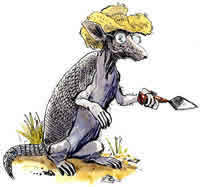Ask Dr. Dirt
I Want To Be an Archeologist! |
|
 |
Q: Dr. Dirt, I want to be an archeologist when I grow up. Should I start digging in my backyard to practice? A: Well, it's not quite that simple. People train for many years before they actually become archeologists. You can begin by visiting museums and historical places, and by studying subjects like history, science and foreign languages. Travel whenever you can and make a point of going to historic sites (no, that doesn't mean the oldest ride at Disneyland)! If you're looking for an easy way into archeology—read! There are loads of books on history; you just have to find out what most interests you. |
Q: So I don't need to start digging anything up? I'm just sure there are some T-Rex bones under my dog's house.
A: If you're lucky enough to be able to participate in a real dig, go for it! There's no better way to see if you like archeology than to get covered in dirt and dust! Just remember, there are plenty of ways to dig up information on archeology long before you need to dig in the dirt. And by the way, paleontologists, not archeologists, study dinosaur bones. You better leave that dig to your dog.
Q: When do you get to officially be an archeologist?
A: Well, some archeologists are professionals. They earn their living doing archeology. Other archeologists are avocationals. They do it in their spare time, so this is a two-part answer.
Most professional archeologists get a college degree in anthropology and start working as paid crew members on archeological digs to gain experience. Most of those who stick with it go on to graduate school, where they continue to study archeology. While you're in college, you take special classes that have to do with what you think is cool and interesting. For instance, you may need to learn about geology and geography and other earth sciences that have much in common with archeology. Archeologists also attend "field school." No, they don't study fields, they learn how to dig up artifacts and study them! As you can guess, all this education can take a long time—years in fact. It's a good thing archeologists love history, because they have to learn plenty of it!
Most avocational archeologists belong to one or more archeological societies and associations such as the Texas Archeological Society (TAS), co-sponsor of this website. Many avocational archeologists also study archeology in college or go back to school later in life to learn more. Their most important training comes through archeological fields schools such as the one run by the TAS every June in various locations in Texas. And, the TAS field school has a special Kids field school. Avocational archeologists also learn lots just by reading and hanging out with other archeologists, especially on digs. Serious avocational archeologists often become experts in their local area or on a particular topic that interests them. Texas has a long history of avocational and professional archeologists working together to learn about the past.
Q: Wow! Can I get a good job after all that?
A: Oh, there are lots of jobs out there for professional archeologists: museums, government jobs, university work. But most archeologists spend only part of their time doing field work (remember—that's digging). The rest of the time, they're studying the artifacts they found and writing reports on them. These reports, just like a research report you write in class, share important information that helps others learn history. When you go to a museum, there are usually a few paragraphs written about each artifact on display. This information tells you what the artifact is and what it was used for. What if you went to a museum and saw a bunch of artifacts, but none of them had a story? That's exactly what would happen if we didn't have archeology reports! So as you can see, there's much more to an archeologist's job than digging.
Q: What's the hardest thing about being an archeologist?
A: In most jobs, you don't get covered with dirt, your muscles don't get sore, you don't get dust in your eyes or an aching back. In archeology, you get all that and sometimes sunburns too! But that is what it takes to make exciting discoveries. Most archeologists, like me, actually love to dig. When I'm stuck in the laboratory for too long, I find myself in the backyard doing gardening or any other excuse to scratch up some dirt and have a little fun. The hardest part about being an archeologist for me is being patient. Out in the field, there are days when we don't find anything interesting at all. That can get pretty dull. But I live for the other days when someone makes a terrific discovery.
You might be surprised to learn that many of our most exciting discoveries come not in the field, but weeks or months later back in the lab when we finally put two and two together and realize something new about the past. Yes, archeologists must be very patient and, as you probably know, being patient is not easy!
Texas Beyond History
TBH WebTeam
1 October 2001
